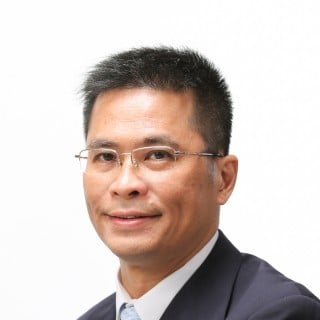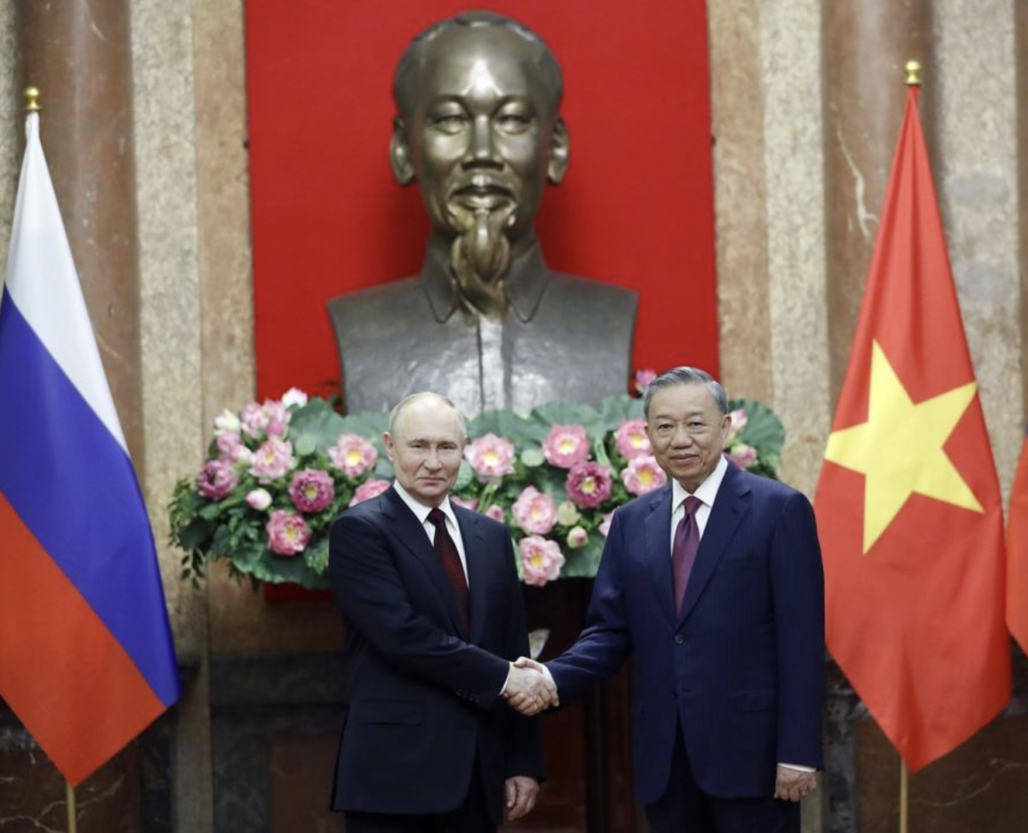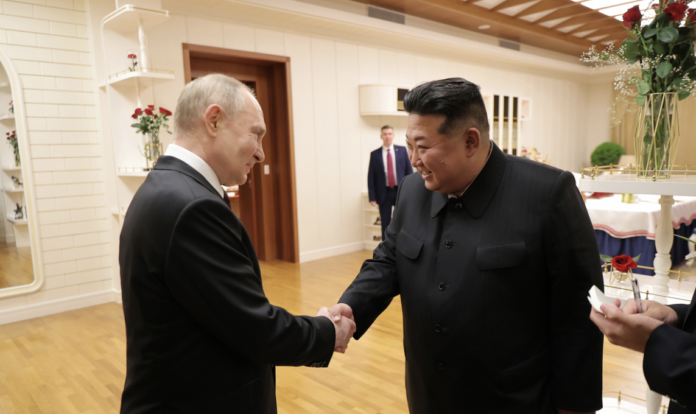The recent defence pact signed between Russian President Vladimir Putin and North Korean President Kim Jong-un is geopolitically significant in not only producing a military alliance between Moscow and Pyongyang but also in generating immediate concerns about the prospects of security and peace in Northeast Asia.

Both Putin and Kim met for two hours after Putin’s first visit to North Korea 24 years ago. Kim said that Russia plays a crucial role in maintaining strategic balance in the world, that North Korea unconditionally supports Russian military action in Ukraine for the sake of protecting Moscow’s sovereignty, security and territorial integrity, and that Pyongyang is keen to strengthen strategic collaboration with Russia. Kim’s remarks could be seen as a triumph of Putin’s visit to secure solid political support from his neighbouring country, while sharing their common ground of opposing the US.
The comprehensive strategic partnership agreement signed between Putin and Kim has 23 articles, but the most significant one is Article 4, which says that any signatory side that is invaded by another country or a group of countries will trigger the military aid of another signatory by all means. Such an act will be in conformity with Article 51 of the UN Charter which states that any member state under armed attack has the right of self-defence, individually or collectively.
This defence pact has immediate geopolitical implications.
First and foremost, while Russia has recently hardened its stance on the Ukrainian conflict by reiterating that it is willing to negotiate with Ukraine only if Kyiv abandons those territories militarily occupied by Moscow and only if Kyiv does not join NATO, the military pact between Moscow and Pyongyang can back up the Russian bargaining position further. In other words, if Russia were attacked by NATO forces, North Korea would join Russia as a military ally.
Under these circumstances, Ukraine is and will be under tremendous pressure to revert to a buffer state without explicitly siding with NATO and yet being forced to concede at least some territories to Russia – a position that is so far rejected by Ukrainian President Volodymyr Zelenskyy. Yet, strategically, Putin and his advisers are keen to neutralise and minimise the military influence of NATO by creating Ukraine as a buffer state while swallowing the already occupied territories in Ukraine and Crimea. For NATO and Ukraine, Putin’s demands are unacceptable, and as such, the military and political impasse in the Ukrainian conflicts will persist without a viable solution, at least in the short run.
Secondly, given that North Korea has already provided weapons and logistical supplies to Russia in the Ukrainian war, as many news reports have said, the North Korean weapons will continue to be exported to the Russian arsenals. In September 2023, it was reported that North Korea had already exported 10,000 containers of ammunition to Russia. The South Korea news have recently reported that a large number of containers ships have left North Korea for Russia. Weapons transactions mean lucrative business to North Korea even though the media reported that the quality of some North Korean weapons was questionable. Yet, the Russian aid to North Korea can and will improve the quality and capabilities of Pyongyang’s weaponry in the near future.
On the other hand, during Kim Jong-un’s recent visit to Russia, he expressed his interest in the Russian missile technology. Obviously, Russia continues to supply rocket, missile, and space technology to North Korea – a win-win situation to both sides.
As such, the improving military technology and intelligence of North Korea, with the full support of Russia, is posing a serious military threat to the military alliance between the US, Japan and South Korea. While South Korea immediately protested against the defence pact between Moscow and Pyongyang, Tokyo also expresses its displeasure especially as the North Korean ballistic missile development has posed a security threat to Japan. If Russia is going to strengthen North Korea’s nuclear submarine technology, their military pact will certainly pose a greater threat to the Washington-Tokyo-Seoul military alliance in the coming years.
Sandwiched between the Moscow-Pyongyang military pact and the triple alliance of the US-Japan-South Korea, China’s position is diplomatically difficult. The recent trade summit between China, South Korea and Japan, which also called for denuclearization in the Korean Peninsula, was not received positively by Pyongyang. Although North Korea sees China as a socialist brother, it has viewed Beijing’s gestures of friendships to Tokyo and Seoul with suspicious eyes. Trust-building between China and North Korea remains not easy as Kim Jong-un and his military generals are sticking to the military first policy rather than seeing pragmatic economic modernization and trade liberalization as the solutions to Pyongyang’s economic predicament. With the continuous sale of North Korean weapons to Russia, it can and will provide the necessary revenues to sustain the North Korean economy and to legitimize the Kim regime. In short, Pyongyang prefers a policy of militarization, and it sees weapons transactions as economically lucrative with the impact of maintaining domestic stability and political order.
The military alliance between Russia and North Korea is going to curb the role of China as a potential peacemaker in the Ukrainian conflicts and a potential mediator in the relations between the two Koreas. If the Russian military pact with North Korea consolidates the hardline position of Moscow on the Ukrainian conflicts, the space for China to mediate in the Ukrainian war is perhaps much narrower than before. Similarly, if South Korea and Japan see the defence pact between Moscow and Pyongyang as a move “violating” the UN sanctions against Pyongyang, it is increasingly difficult for China to intervene as a mediator trying to persuade and lobby North Korea towards the path of denuclearization.
In recent days, North Korean soldiers have been erecting military barriers in the border areas with South Korea – a sign of increased tensions amid the usage of cross-border balloons from both sides as perhaps the tools of political propaganda. These activities followed a move by North Korea to declare the end of a military agreement with South Korea in November 2023, re-stationing heavy military weapons along the border areas. In December 2023 and January 2024, the North Korean Workers Party proclaimed that the relations with South Korea are “hostile” and “belligerent” instead of being “the same race and the same quality.” It seems that North Korea has seen the persistent US military alliance and exercises with South Korea as militarily provocative and politically unacceptable.
Putin was politically shrewd by visiting Vietnam after his path-breaking trip to North Korea. Under the bamboo diplomacy that emphasizes the finesse of flexibility, Vietnam has reached agreements with Russia on natural gas, energy, industrial cooperation, investment, mining, digital technology, nuclear technology and anti-terrorism. Vietnam has been adopting a skilful diplomacy of the balance of power in the Asia-Pacific region by maintaining friendly socialist brotherhood and peaceful relationship with China, by improving comprehensive cooperative partnership with the US since 2013, and by balancing the US through its bamboo diplomacy of enhancing bilateral relations with Russia.

North Korea has stood out as the beneficiary of the defence pact with Russia. Putin’s red-carpet treatment in North Korea was a testimony to how Kim Jong-un perceived Russia’s military, technological, energy, trade and strategic importance to North Korea. Putin gave the luxurious Aurus car – the Russian Rolls-Royce – to Kim, thereby elevating bilateral relations to a new apex.
In response to South Korea’s comment that Seoul may provide military aid to Ukraine after the completion of the defence pact between Moscow and Pyongyang, Putin has warned Seoul against doing so because Russia would take “corresponding action.” Such a tit-for-tat approach is perhaps a warning signal to peace and stability in the Korean Peninsula.
Putin has added that if the Western nations provide military weapons to Ukraine, Russia will also provide military aid to North Korea and other countries. His strategy of utilizing military aid to support the adversaries of the Western countries means that a new Cold War is taking shape, perhaps having the unintended consequences of widening the likelihood of military conflicts from Ukraine to northeast Asia and other parts of the world.
The defence pact between Moscow and Pyongyang could be timed deliberately and strategically before the US presidential elections, which may see a political comeback of Donald Trump. Given Trump’s positive relations with Kim Jong-un in 2018, when they met to achieve peace in northeast Asia, the defence pact between Russia and North Korea could strategically test US foreign policy after the presidential elections, particularly if Trump were to return to power. It is now unknown whether US foreign policy would change in the cases of Ukraine and North Korea, especially if Trump may be an unpredictable political leader with highly unpredictable directions in international politics and diplomacy.
In conclusion, the defence pact between Putin and Kim was a victory to both Russia and North Korea at a time when Moscow needs more countries to support its hardline stance on the Ukrainian conflict, and at a time Pyongyang sees weapons transactions as a means to perpetuate its military first policy, to improve its missile and rocket technology and to sustain its economy. However, the unintended consequence is to perhaps weaken China’s role as a mediator in both the Ukrainian conflict and the northeast Asian security challenges. Perhaps the alliance between Moscow and Pyongyang is timed to test a possible change in US diplomacy after the forthcoming presidential elections.
*Sonny Shiu-Hing Lo is a political scientist, veteran commentator, and author of dozens of books and academic articles on Hong Kong, Macau, and Greater China




















